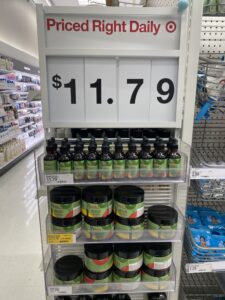
In late December, TikTok influencer Alix Earle reviewed Mielle Organics Rosemary Mint Scalp & Hair Strengthening Oil. She ranked the oil amongst one of her best products of 2022 and praised it for the “tremendous growth results” she saw.
Despite the oil and all the other Mielle Organics products marketed for textured hair, Earle’s video led to more white users buying and reviewing it. According to NBC News, Black and white TikTok users commented under Earle’s video, saying things like “hey girly this oil is not for us” and “great, now Mielle is about to be gentrified.”
After going viral on TikTok, the oil began flying off the shelves, as white people wanted to try it and black people wanted to buy it before it sold out. Florida A&M graduate 1st Lieutenant Monét Daniels says she has been a loyal Mielle customer for over a year, but has problems finding the product now.
“The TikTok craze caused the product to not be in stock anywhere near me,” Daniels said. “Being that I live in a predominantly white area, they probably heard about the oil and purchased it to experience it themselves.”
Due to supply and demand, the product became more inaccessible to communities that needed it. In addition, the retailers who still had the oil were selling it at an increased cost, above market value.
Toni Coleman, a second-year criminal justice major at FAMU, started working at Best Beauty Supply approximately five months ago. Since then, she’s gotten a unique perspective on the Mielle Hair Oil situation.
“We had to store the oil behind the counter because it was selling out a lot, and a lot of people were coming in asking about it,” Coleman said. “It became now so like a high-danger item.”
The controversy behind this TikTok video is that white women have habitually invaded black spaces and capitalized off it. Every time this phenomenon occurs, Black women are the ones who suffer. For example, white women using a product made for Black women makes the already small natural hair section even smaller.
Lieutenant Daniels feels that white women using products not marketed for them is an issue. Still, she believes the more significant problem is Black people not regulating who can use their products.
“I think that Mielle was a product made for black hair, but they got money hungry once sales increased,” Daniels said. “You don’t see white people making things for ‘all hair types .’I just think, as black people, we should take pride in gatekeeping certain things.”
Mielle Organics Founder and CEO Monique Rodriguez recently sold her company and joined the P&G conglomerate. NBC news reports she will maintain her position as CEO and continue making the products Mielle is known for. Rodriguez posted a message on Instagram assuring her customers she won’t ever change the formula of her products. However, people are still concerned because this isn’t the first time a situation like this has occurred.
In 2017, Shea Moisture products became very popular amongst white consumers. Asia Miller, fashion and beauty writer for thecut.com, says the company changed its formula and raised its prices to further accommodate white women.
Coleman is a major supporter of black businesses. She says it’s necessary for Black businesses to expand, but not at the cost of their Black customers. “It’s a good thing for companies and businesses to expand, it is,” Coleman said. “But also consider a Black girl’s heart seeing a product made to make her thicker hair bought out by white girls…It’s hard seeing little girls like that.”